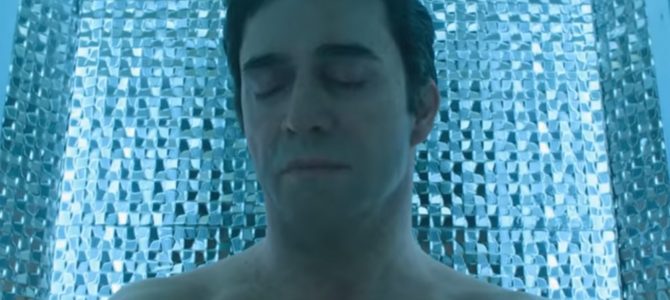
After the latest success of “Black Mirror,” Netflix has published another depressive series about the future, “Altered Carbon,” and is preparing a third. We have some things to learn about our fears and our failures by paying attention to “Altered Carbon’s” tale of human minds uploaded to bioengineered bodies, but we have to cut through some stuff to get there.
Conservatives don’t do story-telling for Netflix, so it’s by default liberal. The first thing to learn is that latter-day liberalism has no confident, much less happy stories. It’s all anguish. It’s helpless fascination with a future wrought of its own individualism, which it finds repugnant and unbearable.
The show, made after a series by British author Richard Morgan, is an indictment of a future where the wealthy are immortal by buying themselves new bodies to transport their minds to when the old bodies wear out, and the rest of humanity lives impoverished in slums. The American middle class self-understanding is nowhere in sight.
The lives of the rich are a combination of soap opera and murder mystery. The lives of the poor are a mix of fetishes and the Left’s usual race and class ideology. Our protagonists play detective and move between worlds. All the clichés you want are there, from the sassy Latina fighter pioneered by James Cameron in “Aliens” to the tough-guy with wounds in his past who’s just too handsome for women to object to his ferocity or witlessness. It’s a morality play in the old lefty tradition, reducing humanity to exploitation.
Indeed, the show obeys all the pieties of the Netflix-watching classes, so you can see certain things about how society is changing. The sex is more aggressive, athletic, and hateful; female nudity loses out to male nudity. The cast is ethnically varied, which may or may not make up for yet another white male protagonist. Of course, none of the protagonists can be ugly, or even plain—that sort of diversity is unthinkable.
Immortality Is the New Class Divide
Beyond fan service, such stories arouse and soothe viewers’ fears. Thus, the conceit of the movie, that the human soul has been technologized and thus put into and brought out of endless numbers of bodies. This gives many opportunities to make points about class separation that you’d otherwise read about in Charles Murray or Robert Putnam.
At some level people know this, but they fear it and can only see it obliquely and with the obligatory lefty hatred of inequality, to camouflage complicity. After all, a Netflix subscription is not a way to help those less well off than oneself, but a way to isolate oneself from them.
Health and lifespan as the new class separation also rehearses the fears of what technological progress will bring and might reveal about people. Endless cruelties are perpetrated on screen and torture is at a premium, in ways not even “The Punisher” contemplated. It seems the author intended this to shock people into taking violence seriously, but maybe it’s just a way to make his political points without getting in the way of a story people want to hear.
The violation of bodies aims to persuade the audience that the perpetrators are not human. The primary audience can have all the thrills of slaughter and all the moral condemnation at once. The crucial element here is how unwilling most people are to give up on their bodies, even in a future where there’s another one waiting.
That’s the limit to science—the sense that the human body is holy, which persists as a limit on the imagination long after Christianity, its source, has been forgotten. Scars and tattoos are memories in this story and the finality of the death of loved ones constitutes the moral core of our protagonists. Either technology cannot repeal the source of individuality in mortal flesh or the writers cannot imagine it doing so.
Stuck In a Never-Ending Labyrinth of Oppression
Beyond this lies the problem of the plot. The author stated in an interview: “Society is, always has been and always will be a structure for the exploitation and oppression of the majority through systems of political force dictated by an elite, enforced by thugs, uniformed or not, and upheld by a willful ignorance and stupidity on the part of the very majority whom the system oppresses.” Because the story cannot escape these limits and either think through the origins of a society or its end, the show never reaches the core human issues.
Instead of examining the parts of the human soul on display in this future situation where our scientific ambitions and powers have jeopardized our integrity, we get the standard combination of sentimentality and cruelty that betrays the impasse of individualism. The powerful are reviled; the powerless are despised. No one can let go of the quest for ever more power; no one who attains it is anything but corrupt. The antagonists are monsters, but the heroes are no more capable of moral clarity than any one else is.
The show’s primary audience is ultimately a middle class watching a world where it no longer exists. That view was designed and assembled by people who don’t think that audience needs to learn or can be taught the fundamental things. We look to future stories to learn what’s wrong with us. If we daren’t learn, all we get is some flattery.
It’s not just moral heroism that’s needed, however—someone willing and able to defend human dignity. These futuristic stories are also attractive because they bring back tragedy and mythology. They show possibilities foreclosed to a middle-class way of living, but fascinate people nevertheless. That is also a path to self-understanding, but it is also denied the audience. That would take authors who take tragedy seriously and have more wisdom than fashionable lefty moralism can comprehend.









